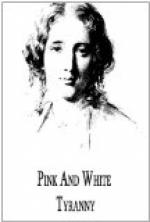He had read the story of Monte Cristo, with its highly wrought plot of vengeance, and had determined to avenge himself on the woman who had so tortured him, and to make her feel, if possible, what he had felt.
So, when he had discovered the hours of driving observed by Mrs. Follingsbee and Lillie in the park, he took pains, from time to time, to meet them face to face, and to pass Lillie with an unrecognizing stare. Then he dashed in among Mrs. Follingsbee’s circle, making himself everywhere talked of, till they were beset on all hands by the inquiry, “Don’t you know young Endicott? why, I should think you would want to have him visit, here.”
After this had been played far enough, he suddenly showed himself one evening at Mrs. Follingsbee’s, and apologized in an off-hand manner to Lillie, when reminded of passing her in the park, that really he wasn’t thinking of meeting her, and didn’t recognize her, she was so altered; it had been so many years since they had met, &c. All in a tone of cool and heartless civility, every word of which was a dagger’s thrust not only into her vanity, but into the poor little bit of a real heart which fashionable life had left to Lillie.
Every evening, after he had gone, came a long, confidential conversation with Mrs. Follingsbee, in which every word and look was discussed and turned, and all possible or probable inferences therefrom reported; after which Lillie often laid a sleepless head on a hot and tumbled pillow, poor, miserable child! suffering her punishment, without even the grace to know whence it came, or what it meant. Hitherto Lillie had been walking only in the limits of that kind of permitted wickedness, which, although certainly the remotest thing possible from the Christianity of Christ, finds a great deal of tolerance and patronage among communicants of the altar. She had lived a gay, vain, self-pleasing life, with no object or purpose but the simple one to get each day as much pleasurable enjoyment out of existence as possible. Mental and physical indolence and inordinate vanity had been the key-notes of her life. She hated every thing that required protracted thought, or that made trouble, and she longed for excitement. The passion for praise and admiration had become to her like the passion of the opium-eater for his drug, or of the brandy-drinker for his dram. But now she was heedlessly steering to what might prove a more palpable sin.
Harry the serf, once half despised for his slavish devotion, now stood before her, proud and free, and tantalized her by the display he made of his indifference, and preference for others. She put forth every art and effort to recapture him. But the most dreadful stroke of fate of all was, that Rose Ferguson had come to New York to make a winter visit, and was much talked of in certain circles where Harry was quite intimate; and he professed himself, indeed, an ardent admirer at her shrine.




